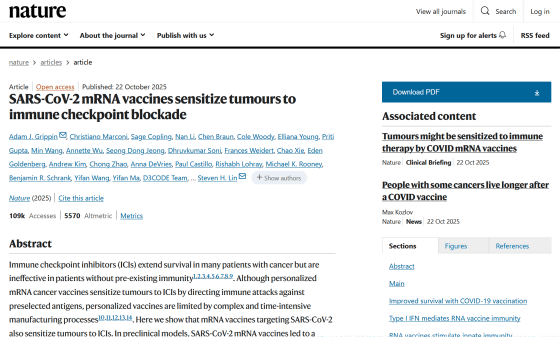COVID-19 mRNA vaccine may activate 'cancer-fighting immune system'

The mRNA vaccines developed to combat COVID-19
SARS-CoV-2 mRNA vaccines sensitize tumors to immune checkpoint blockade | Nature
https://www.nature.com/articles/s41586-025-09655-y

COVID-19 mRNA vaccines could unlock the next revolution in cancer treatment – new research
https://theconversation.com/covid-19-mrna-vaccines-could-unlock-the-next-revolution-in-cancer-treatment-new-research-258992
While developing an mRNA vaccine for brain tumor patients, researchers at The University of Texas MD Anderson Cancer Center and their colleagues discovered that the immune system can be trained to kill tumors even when the target mRNA is unrelated to the cancer. Based on these results, Grippin and his colleagues hypothesized that an mRNA vaccine designed to target the SARS-CoV-2 virus, which causes COVID-19, might also have an antitumor effect.
Grippin and his team investigated the clinical outcomes of more than 1,000 patients with advanced melanoma and lung cancer who received immunotherapy with immune checkpoint inhibitors , which block the mechanisms by which cancer tumors suppress immune cells, allowing the immune system to continue attacking cancer cells.

Analysis of the data found that patients who received either the Pfizer or Moderna mRNA-based COVID-19 vaccine within 100 days of starting treatment with an immune checkpoint inhibitor were more than twice as likely to be alive three years later compared with patients who did not receive either vaccine.
Surprisingly, the efficacy of COVID-19 vaccines was also seen in patients who typically do not respond to immunotherapy, with this group experiencing an approximately five-fold improvement in three-year survival. The association between improved survival and mRNA-based COVID-19 vaccination remained robust even after accounting for factors such as cancer severity and comorbidities.
Furthermore, the research team conducted animal experiments using mice to investigate the mechanism by which mRNA-based COVID-19 vaccination affects the efficacy of immune checkpoint inhibitors. The experiments confirmed that the COVID-19 vaccine acts as a kind of alarm, activating the body's immune system to recognize and kill cancer tumor cells, overcoming the ability of cancer cells to suppress immune cells.
While treatment using immune checkpoint inhibitors has benefited many patients, it has been difficult to demonstrate efficacy in patients with '

Many scientists, including Grippin, have been working on developing personalized mRNA cancer vaccines for cancer treatment. However, these mRNA cancer vaccines require taking a small sample from the patient's tumor and using machine learning algorithms to predict the optimal target protein, which makes them expensive and difficult to manufacture. On the other hand, mRNA-based COVID-19 vaccines have the advantage of being not only already developed but also relatively inexpensively available in wide areas around the world, making them a very low barrier to entry.
Grippin and his research team are preparing a nationwide clinical trial for lung cancer patients to investigate whether an mRNA-based COVID-19 vaccine can be useful in treating patients with immune checkpoint inhibitors. 'This study will clarify whether an mRNA-based COVID-19 vaccine should be incorporated as part of the standard of care for patients receiving immune checkpoint inhibitors,' Grippin said. 'By utilizing familiar vaccines in a new way, we hope to bring the life-saving benefits of immunotherapy to cancer patients who have not previously benefited from them.'
Related Posts:
in Free Member, Science, Posted by log1h_ik







